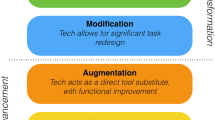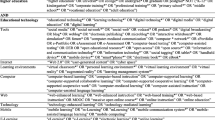Abstract
The Pre-service Technology Teacher Education Resource (PTTER) was developed as a cross-institutional resource to support the development of initial technology teacher education programmes in New Zealand. The PTTER was developed through collaboration involving representatives from each of the six New Zealand university teacher education providers, Massey University, University of Auckland, University of Canterbury, University of Otago, Victoria University and University of Waikato, working with the National Technology Professional Development Manager. The framework for PTTER is built on four key elements considered to be essential to the education of technology teachers. The four elements are: philosophy of technology, rationale for technology education, technology in the New Zealand curriculum, and teaching technology. The PTTER is a web-based resource aimed at assisting technology teacher educators in the development of their teacher education programmes. The framework is a statement of shared philosophy, purpose and intent and is located on the Techlink website (www.techlink.org.nz). PTTER contains a range of teaching resources and strategies located within an overall framework for initial technology teacher education programmes. This paper describes the rationale for the PTTER framework, the process through which it was developed, explanation of each of the framework’s elements, and concludes with discussion of the framework’s implementation and future development.
Similar content being viewed by others
References
Alexandra, P. (2003). The development of expertise: The journey from acclimation to proficiency. Educational Researcher November 32(8). Retrieved November 22, 2009, from http://edr.sagepub.com/content/32/8/10.full.pdf+html.
Basalla, G. (1988). The evolution of technology. Cambridge: Cambridge University Press.
Bronowski, J. (1973). The ascent of man. London: Warner Books.
Burns, J. (1990). Students’ attitudes towards and concepts of technology. Report to the Ministry of Education. Wellington.
Compton, V., & Compton, A. (2010). Technological knowledge and the nature of technology: Implications for teaching and learning. Summary and research findings: Stage two. Retrieved from http://www.techlink.org.nz/curriculum-support/TKNOT-Imps/page3.htm.
Compton, V. & France, B. (2007). Redefining technological literacy in New Zealand: From concepts to curriculum constructs. In J. Dakers, & W. Dow (Eds.), Teaching and learning technological literacy in the classroom. PATT18 International Conference, University of Glasgow.
Cosgrove, M. (1989). Learning science from technology. Unpublished DPhil thesis, University of Waikato, New Zealand.
Cosgrove, M., & Schaverien, L. (1994). Technology learning 1: Towards a curriculum for children who are technologists. International Journal of Technology and Design Education, 12, 222–240.
Dakers, J. (2006). Towards a philosophy for technology education. In J. Dakers (Ed.), Defining technological literacy. New York: Palgrave Macmillan.
de Vries, M. (2005). Teaching about technology: An introduction to the philosophy of technology for non-philosophers (Vol. 27). Dordrecht: Springer.
Elliott, E. (2008). Balancing stakeholders’ interests in evolving teacher education accreditation contexts. College Teaching Methods & Styles Journal, 4(3), 53–58.
Gambhir, M., Broad, K., Evans, M., & Gaskell, J. (2008). Characterising initial teacher education in Canada: Themes and issues. Toronto: University of Toronto.
Griffin, P., Kim Cuc, N., Ure, C., & Pavlovic, M. (2008). Study in teacher quality: Report on study in scaling-up solutions, the implementation of teacher professional profiles. Melbourne: Ministry of Education and Training, Vietnam.
Hall, T. J. K. (2001). Should technological literacy be a mandate for technology education programmes. International Journal of Industrial Teacher Education, Winter, 38(2), 99–107.
Harwood, C., & Compton, V. (2007). Moving from technical to technology education: Why is it so hard? Paper presented at the TENZ Biennial Conference 07, Auckland.
Jones, A. (2003). The development of a national curriculum in technology for New Zealand. International Journal of Technology and Design Education, 13, 83–99.
Jones, A. & Carr, M. (1993). A framework for technology education in towards technology education, Vol 1: Working papers from the first phase of the learning in technology education project (pp. 1–48). Centre for Science and Mathematics Education Research, University of Waikato, Hamilton, New Zealand.
Kaplan, D. (Ed.). (2004). Readings in the philosophy of technology. New York: Rowman & Littlefield.
Kimbell, R., Stables, K., & Green, R. (1996). Understanding practice in design and technology. Buckingham: Open University Press.
Lewis, T. (1991). Technology as general education. The Journal of General Education, 40, 34–48.
McCormick, R. (1997). Conceptual and procedural knowledge. International Journal of Technology and Design Education, 7, 141–159.
McIntyre, D. (1995). Initial teacher education as practical theorising; a response to Paul Hirst. British Journal of Educational Studies, 43(4), 365–383.
Ministry of Education. (2007a). Ministry of Education support for schools and teachers in the implementation of the technology curriculum in the New Zealand curriculum. Retrieved April 2010, from http://www.techlink.org.nz/.
Ministry of Education. (2007b). The New Zealand curriculum. Wellington: Learning Media.
Ministry of Education. (2009a, April 2009). Explanatory papers: Characteristics of technological outcomes. Explanatory Papers Retrieved March 30, 2010, from http://www.techlink.org.nz/curriculum-support/papers.htm.
Ministry of Education. (2009b). Indicators of progression. from http://techlink.org.nz/curriculum-support/indicators/index.htm.
Ministry of Education. (2010). Techlink. Retrieved March 19, 2010, from http://www.techlink.org.nz/curriculum-support/indicators/index.htm.
Moreland, J. (2009). Assessment: Focusing on the learner and the subject. In A. T. Jones & M. J. de Vries (Eds.), International handbook of research and development in technology education (pp. 445–447). Rotterdam: Sense.
Moreland, J., & Jones, A. (2000). Emerging assessment practices in an emergent curriculum: Implications for technology. International Journal of Technology and Design Education, 10(3), 283–305.
Moreland, J., Jones, A., & Chambers, M. (2001). Enhancing student learning in technology through teacher technological literacy. Wellington: University of Waikato.
Mortlock, A. (2005). The technologist-toddler an intentionality. The First Years Ngā Tau Tuarahi, 7(2), 30–32.
New Zealand Teachers Council (2007). Graduating teacher standards. Retrieved April 2011, from http://www.teacherscouncil.govt.nz/te/gts/index.stm.
New Zealand Teachers Council (2010). Registered teacher criteria. Retrieved April 2011, from http://www.teacherscouncil.govt.nz/rtc/rtc.stm.
Patterson, M. (2009). Confusion or clarity: Has the 2007 New Zealand curriculum provided primary teachers with clearer understandings of technological knowledge? Paper presented at the Technology Education New Zealand conference.
Ropohl, G. (1997). Knowledge types in technology. International Journal of Technology and Design Education, 7, 65–72.
Snape, P., & Fox-Tiurnbull, W. (2011) Perspectives of authenticity: Implementation in technology education. International Journal of Technology and Design Education. doi:10.1007/s10798-011-9168-2.
The Economist (1999). Innovation in industry survey. February 20th, pp. 5–24.
Turnbull, W. (2002). The place of authenticity in technology in the New Zealand curriculum. International Journal of Technology and Design Education, 12, 23–40.
Wilson, F. (1998). The hand: How its use shapes the brain, language and, human culture. New York: Random House.
Zuga, K. (1992). Social reconstruction curriculum and technology education. Journal of Technology Education, Spring. Retrieved from http://scholar.lib.vt.edu/ejournals/JTE/v3n2/html/zuga.html.
Acknowledgments
We wish to acknowledge the New Zealand Ministry of Education for its funding that provided the opportunity to develop the PTTER. We also thank our respective institutions for supporting our involvement in this development.
Author information
Authors and Affiliations
Corresponding author
Rights and permissions
About this article
Cite this article
Forret, M., Fox-Turnbull, W., Granshaw, B. et al. Towards a pre-service technology teacher education resource for New Zealand. Int J Technol Des Educ 23, 473–487 (2013). https://doi.org/10.1007/s10798-011-9199-8
Published:
Issue Date:
DOI: https://doi.org/10.1007/s10798-011-9199-8




